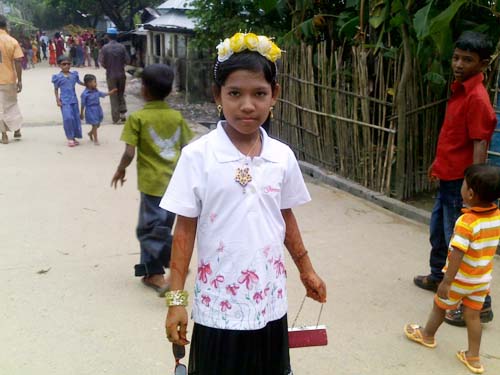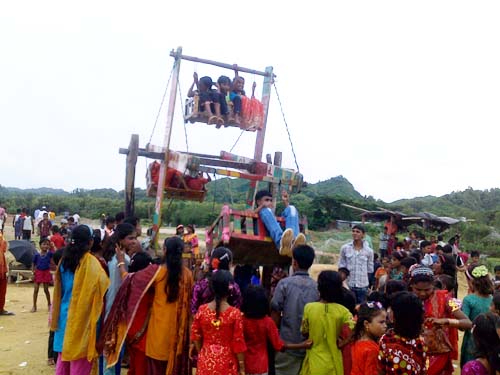(Feature) An eight-year-old girl, Hajara Khatun, and other refugee children joined together with their families to celebrate Eid-festival from August 31 to September 2, in Nayapara and Kutupalong refugee camps, where they have been living for a long time.
An eight-year-old girl, Hajara Khatun, and other refugee children joined together with their families to celebrate Eid-festival from August 31 to September 2, in Nayapara and Kutupalong refugee camps, where they have been living for a long time.

Eid-ul-Fitr is a joyus time for Muslims.
Hajara said in a recent interview she wore a beautiful outfit on Eid-day and visited her friends.
She and her father went to Teknaf market to buy the special clothes for Eid-day. They paid one thousand taka (USD$13.00).
“I visited relatives’ huts in the camp. They gave me vermicelli and prepared sweet delicacies. These are a special treat for the guests on this day,” she said.
“I am very happy today as I can enjoy this day only once per year. Today is special for me.”
She had so much fun, she was sorry when the holiday came to an end for another year.
“Now, I have to wait for next Eid-day to come again.”
Like Hajara, many people joined in the Muslim festival (Eid-ul-Fitr), despite some troublesome weather.
“This year, we could not arrange a big place or field for special prayer as the weather was very bad. So we went to mosques to perform our prayers,” Hussain, from the Nayapara camp, said in an interview.
“We pray to Almighty Allah (God) to get rid of our previous sins, which we had done by mistake,” he said.
“We embrace the festival with open heart, it is inspiring and brings pleasure to all. Eid Mubarak.”
Another refugee said Eid-day is a special time for Muslims all over the world. He is very happy during Eid-ul- Fitre.
According to the BBC, after the Eid prayer, Muslims usually travel to visit various family and friends, give gifts (especially to children), and make phone calls to distant relatives to give well-wishes for the holiday. These activities traditionally continue for three days. In most Muslim countries, the entire a 3-day period is an official government/school holiday.

The Eid -ul-Fitr, is often abbreviated to Eid, a three-day Islamic holiday that marks the end of Ramadan, the Islamic holy month of fasting (sawm). Eid ul-Fitr falls on the first day of Shawwal, the month which follows Ramadan in the Islamic calendar. Traditionally, the festival begins when the new moon is first seen in the sky. The first Eid was celebrated in 624 CE by the Prophet Muhammad (puh) with his friends and relatives after the victory of the battle of Jang-e-Badar.
During the festival of Eid ul-Fitr, Muslims celebrate the end of fasting, and give thanks to Allah for help and strength throughout the previous months. Muslims celebrate it by gathering with friends and family, preparing sweet delicacies, wearing new clothes, giving each other gifts and putting up lights and other decorations in their homes.
To mark the beginning of Eid, Muslims go to their local mosques or Eidgha (big field) to perform special congregational prayers known as Salaat and many will also give special charitable contributions, known as Zakat-al-Fitr. The common greeting during this holiday is the Arabic greeting "Eid Mubarak" (“Have a blessed Eid”).
Eid is also a time of forgiveness, and making amends, said a religious teacher.
It also seems to be a time for making allowances for fun activities. As a special treat, the youngsters get to play on a carnival-like ride, called “the hammock”.
A boy from Nayapara Camp says that we are now very happy as we can ride on the hammock during Eid festival. “Happy Eid-Mubarak, Happy Eid-Mubarak,” he said.
“Today, we can ride in hammock because it is Eid-day, we never ride in the hammock on other days,” he said.


